Heirs to the Raj
Francis King
The Club Indira Mahindra (Bodley Head £7.95)
When, on a recent-visit to India, I was having dinner in a hotel restaurant in Khajuraho, I suddenly heard a loud, arro- gant male voice behind me: 'I've had enough of your bloody cheek! Fetch me the manager double-quick!' At once, I seemed to have been shunted back to my childhood, 50 years before, in the country. But when I turned round, expecting to see some leathery-faced, pot-bellied pensioner of the Raj, there, instead, was a youthful Sikh, beautifully dressed in grey raw-silk and turban, with his wife and three child- ren. He banged the table and shouted 'gain to the waiter cowering before him: Fetch me the manager!'
It is about such Indians, in every sense heirs to the Raj, as well as about a few British who have 'stayed on' after Inde- pendence, that Indira Mahindra writes in The Club. The only other Indians are the servants who attend on them, discreetly averting their gazes from their amorous Peccadilloes. The word 'club' suggests not Merely people admitted but a far greater number of people kept out; and of the characters with whom the novel deals all, with the exception of those servants, be- twig to a dwindling elite of Indian officials and army officers, a rajah dispossessed of his state, planters and a few English survivors. Their 'club' is thus as much an abstract affiliation as a bricks-and-mortar building, set down in a fictional town, helpur, which, because of its salubrious climate and the lushness of its vegetation, was once regarded as a cushy posting by the British. Rooms closed, and its service inefficient, the physical club is in a state of decline paralleled by the decline of the ruling caste that uses it. As one of the characters, an Englishwoman called Lucy, Puts it, the club, founded in 1898, has now, by the 1950s, become like 'a widowed clueen'. She goes on: 'A queen reigns with "le king — majestic, full-blown — and then the husband dies and she becomes the queen eell mother, her son rules. What a difference that makes! It was quite a club In the forties.' Lucy is one of two step-sisters who are anlOng the few English stayers-on. The °ther step-sister, Mabel, older, mannish land capable, runs the stud-farm that be- 0riged to their now dead father. Lucy, her marriage over, attempts to relieve her inner restlessness and boredom by sleeping tlround. Inevitably, having soon run tnrough the few eligible Englishmen, she limns her attention to the Indians, who
have a sexual curiosity about women with white skins, previously tabu to them.
The pensioned-off Rajah, who at first appears to be seeking Mabel's friendship, is in fact after the stud-farm for his son. The Rajah has a friend — known, like so many anglicised Indians, by an English nickname, Sandy — whose son, English- educated, handsome and determined to make a life for himself away from India, woos Lucy not, as she imagines, because he is in love with her, but because he realises her money will provide him with the escape that his father denies, him. Meanwhile, the Rajah's son is having an affair with the beautiful wife of an army major, balked of the promotion that he deserves because of his Muslim faith. This major, called Abbas, is one of the few Indians portrayed sympathetically.
Indira Mahindra cleverly creates a world parodying that of the English gentry 50 years before. After a dawn visit to a game reserve, her characters settle down in a forest bungalow for breakfast: 'There was steaming porridge, fried eggs, bacon and ham. Crisp toast was being piled next to Anchor butter, Kraft cheese, marmalade, strawberry jam and a large jar of honey. Tinned kippers and mackerel were in bowls.' Conversation over this repast also has an air of parody: 'Gosh, am I hungry!'
`Then eat.' 'You bet!'
Where's the sugar?'
'Here, grab.'
There has been an ugly scene on the visit to the game reserve. Having ensured that he is isolated on an elephant with no one but Mabel and a complaisant mahout, a porcine general has put a hand down her dress. Mabel has been furious: 'You dirty swine, how dare you? How dare you?' The General has answered coolly: 'Forget it. It was just in fun. I thought you'd be a good sport.' Clearly Mabel has a hang-up about sex, as has her sister.
The book, a short one, at first gives the impression of a number of snapshots assembled haphazardly in an album, with the author telling the reader as she flips over the pages: 'This is the older of the two step-sisters . . . This is the younger . . . This is the billiards room of the club . . . Here's the attendant and here, next to him, is the marker . . .' But gradually one realises with what unobtrusive skill one snap- shot has been placed beside another, to create an overall picture of a society on the verge of extinction. There is a lot of fun, some of it far from kindly, at the expense of the kind of Indians who imitate the speech and behaviour patterns, long since out of date, of the former rulers whose places they have taken; but beneath that fun there is the desolation of the two Englishwomen, each hungry for what she cannot have and each afraid to admit the demands of her secret inner nature.






































 Previous page
Previous page